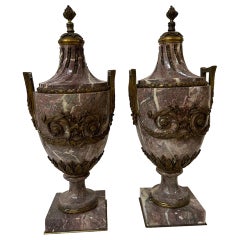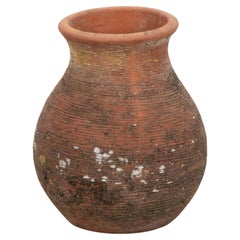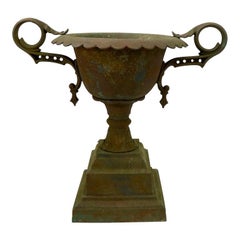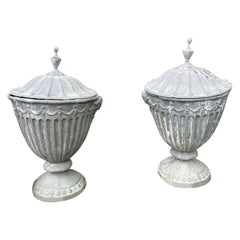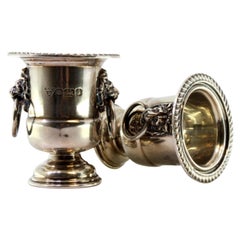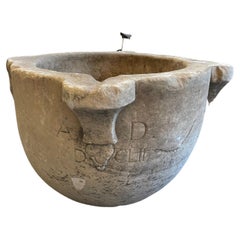Urns
19th Century French Provincial Antique Urns
Marble, Bronze
19th Century French Antique Urns
Terracotta
Late 19th Century American Victorian Antique Urns
Iron
19th Century English Regency Antique Urns
Lead
20th Century European Urns
Silver
1750s Italian Other Antique Urns
Carrara Marble
1880s French Neoclassical Antique Urns
Iron
1910s Italian Vintage Urns
Terracotta
1750s English Georgian Antique Urns
Lead
1870s Italian Neoclassical Antique Urns
Carrara Marble
19th Century French Antique Urns
Iron
Late 19th Century Neoclassical Antique Urns
Iron
Early 20th Century Urns
Terracotta
19th Century French Antique Urns
Iron
1920s Vintage Urns
Terracotta
Early 20th Century North American Country Urns
Iron
2010s Spanish Urns
Metal
1820s French Antique Urns
Marble, Bronze
1820s American American Empire Antique Urns
Lead
2010s Spanish Urns
Resin, Wood
1960s Swiss Mid-Century Modern Vintage Urns
Concrete
1880s English Victorian Antique Urns
Iron
2010s American Modern Urns
Iron
1980s Vintage Urns
Marble
1960s Swiss Mid-Century Modern Vintage Urns
Concrete
Mid-20th Century French Urns
Iron
1850s American American Empire Antique Urns
Iron
Early 20th Century Italian Urns
Marble
19th Century Antique Urns
Copper, Iron
19th Century French Neoclassical Antique Urns
Bronze
19th Century English Antique Urns
Iron
18th Century French Antique Urns
Lead
Early 1900s Antique Urns
Terracotta
1850s American American Empire Antique Urns
Iron
1950s American Vintage Urns
Brass
1940s American Neoclassical Vintage Urns
Iron
Early 20th Century Georgian Urns
Iron
1870s French Empire Revival Antique Urns
Iron
2010s Mexican Modern Urns
Fiberglass
1960s Swiss Mid-Century Modern Vintage Urns
Concrete
1820s American American Empire Antique Urns
Iron
20th Century Rustic Urns
Metal
19th Century Spanish Antique Urns
Terracotta
2010s Mexican Modern Urns
Fiberglass
20th Century Swiss Urns
Concrete
Early 19th Century English Neoclassical Antique Urns
Limestone
1980s Vintage Urns
Bronze
20th Century Italian Urns
2010s Mexican Modern Urns
Fiberglass
2010s Mexican Modern Urns
Fiberglass
1830s English Early Victorian Antique Urns
Iron
2010s Mexican Modern Urns
Fiberglass
Mid-19th Century British Neoclassical Revival Antique Urns
Iron
1880s French Antique Urns
Iron
2010s Mexican Modern Urns
Fiberglass
2010s Mexican Modern Urns
Fiberglass
1960s Swiss Mid-Century Modern Vintage Urns
Concrete
1960s Swiss Mid-Century Modern Vintage Urns
Concrete
Early 20th Century British American Colonial Urns
Marble
Late 19th Century British Victorian Antique Urns
Terracotta
Vintage, New and Antique Urns
When people think of antique and vintage urns — a type of vase with a round body, narrow neck and integrated pedestal — they tend to imagine funerary urns. But all manner of urns have been made over the years, and these vessels can be used as decorative accents either inside your home or in your garden.
Garden urns became popular in early Greek and Roman gardens, where they complemented classical statues and other garden ornaments. Over the years, people have used urns as planters, fountain basins and stylish decorative elements in interiors as well as outdoors in gardens, patios and firepit areas.
Urns are typically made of stone, ceramics or metal. Stone urns are highly durable; while an antique stone urn will show wear with age, it can be used in any climate, and a neoclassical-style cast stone urn with natural world motifs carved in relief is guaranteed to make a statement in your garden. Position two stone urns with vibrant hibiscus bulbs or tulips at the bottom of an outdoor stairway to set it off from other exterior features. Elsewhere, place your urn in the middle of a garden bed to draw attention to your dazzling landscape design. A good concrete urn can easily make a good home for small trees or shrubs, but it will be very heavy to move around.
A ceramic urn is likely going to have thick, robust walls. A glazed terracotta urn, for example, is going to be ideal for potting plants. As glazing is part of the potter’s process for creating a terracotta urn, the urn itself can provide a pop of color to contrast with any low-maintenance plants such as moss or succulents that you have in mind for it.
Metal urns are best used as decor in your living room or foyer rather than outside, unless you’re partial to the alluring weathered patina that is expected to characterize an antique cast-iron garden urn. If you’re planning to use a metal urn as a planter, add a plant liner first. Metal may overheat and damage a plant’s roots if they are not protected, and urns made of certain metals may rust if they’re left outdoors.
But you don’t necessarily need to turn your urn into a planter.
A large urn can hold its own as an accent in any space and create a strong focal point. Browse the collection of decorative antique and vintage urns on 1stDibs today.
